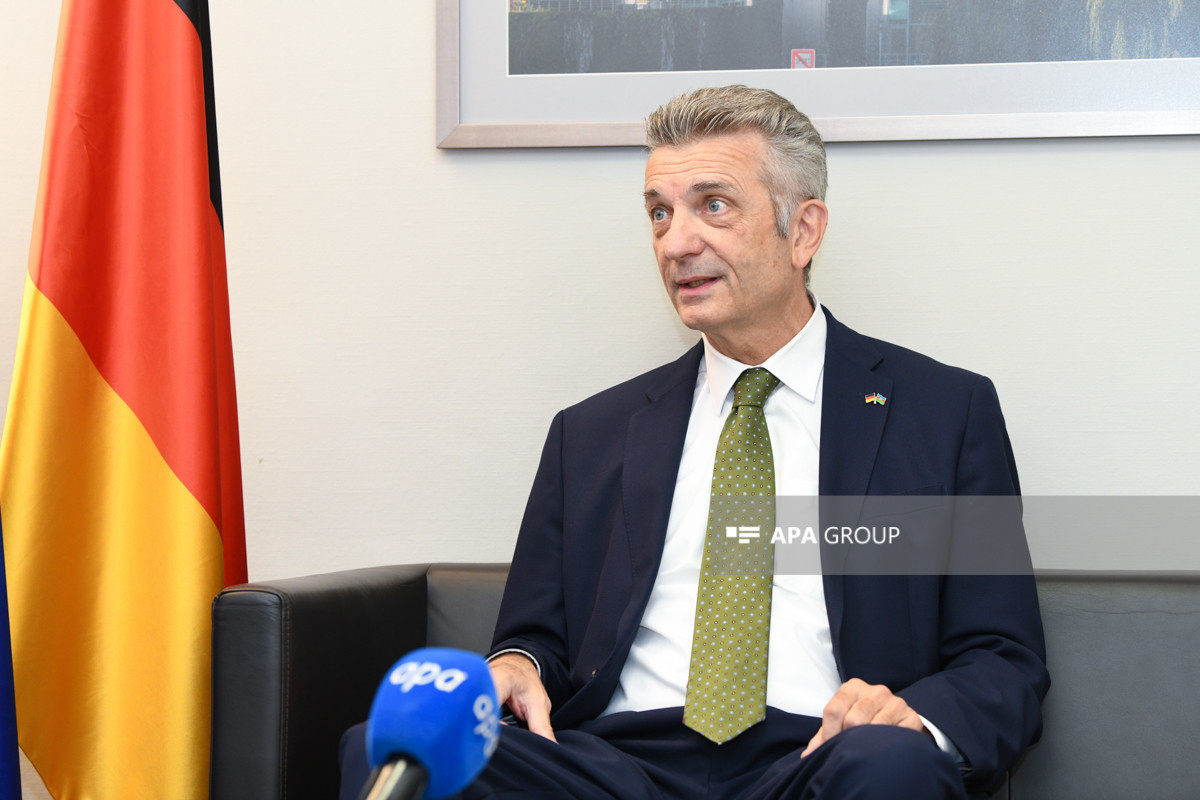APA Agency interviewed Ralf Horlemann, Ambassador Extraordinary and Plenipotentiary of the Federal Republic of Germany to the Republic of Azerbaijan
Germany-Azerbaijan bilateral relations
Germany and Azerbaijan have agreed on a bilateral “roadmap”
– Mr. Ambassador, the visit of the President of the Federal Republic of Germany, Frank-Walter Steinmeier, to Azerbaijan in April this year demonstrated an intensification of political dialogue between the two countries. Following this visit, what specific initiatives are expected?
– The visit of Federal President Frank-Walter Steinmeier to Azerbaijan in April 2025, the first visit ever of a German President to the Republic of Azerbaijan, underlined the strong and dynamic development of relations between Germany and Azerbaijan. With peace between Armenia and Azerbaijan within reach, the prospects for economic development in the region and cooperation with Europe, in particular Germany, have become more promising. As the leading economy in Europe, Germany can provide high technology and know-how in many fields. This includes energy and energy transition, as well as transport and connectivity. Both are of particular importance for Azerbaijan as a major provider of energy and a transport hub along the Middle Corridor. A bilateral Road Map for the expansion of trade, economic, and investment relations was agreed upon between the two sides in May of this year. This opens new prospects for even stronger cooperation in the future.
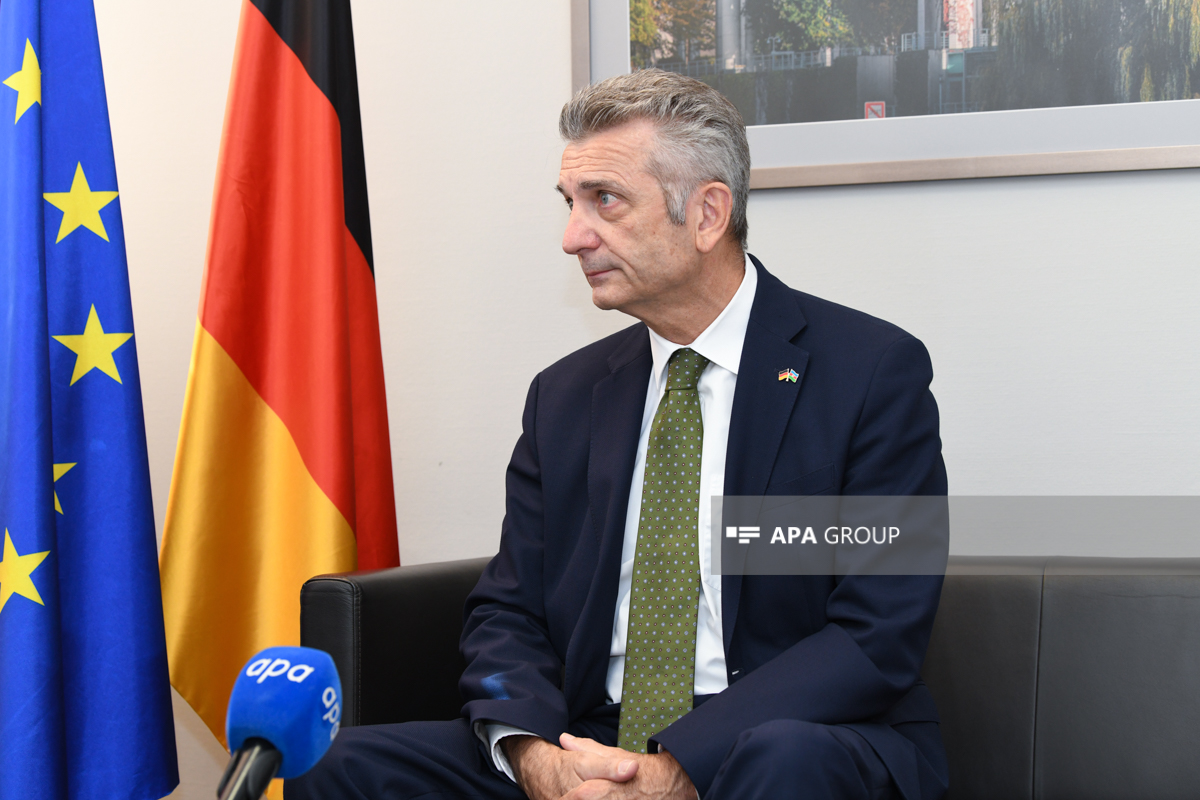
Economic relations and investment potential
Today, Azerbaijan is Germany’s most important economic partner in the South Caucasus
– At present, Germany’s direct investment in Azerbaijan remains relatively modest. What steps should be taken to increase these figures? Which sectors do you believe are most attractive for German investors?
– German heritage is deeply entrenched in Azerbaijan to this day. German-Azerbaijani economic relations look back on a long history: already in the 19th century, German companies like Siemens invested in Azerbaijan and brought state-of-the-art technology to the South Caucasus, contributing significantly to the economic development. Today, Azerbaijan is the most important economic partner for Germany in the South Caucasus. We are currently Azerbaijan’s fifth biggest trading partner and among the top ten investors in the non-oil and gas sector. Just in mid-September, the potential of increased cooperation was discussed in the framework of the High-Level Working Group on Trade and Investment, led by the Azerbaijani Deputy Minister of Economy and the German Ministry for Economic Affairs. Substantial cooperation projects are underway: this year, German energy supplier SEFE signed a ten-year contract with SOCAR for the delivery of 1.5 bcm of gas annually.
Another highlight in German-Azerbaijani business cooperation was the signing of a Roadmap, including a list of potential business projects, between the German Eastern Business Association, the German-Azerbaijani Chamber of Commerce, and AZPROMO in May this year. Other investments are under preparation, including in the sectors of engineering and logistics.
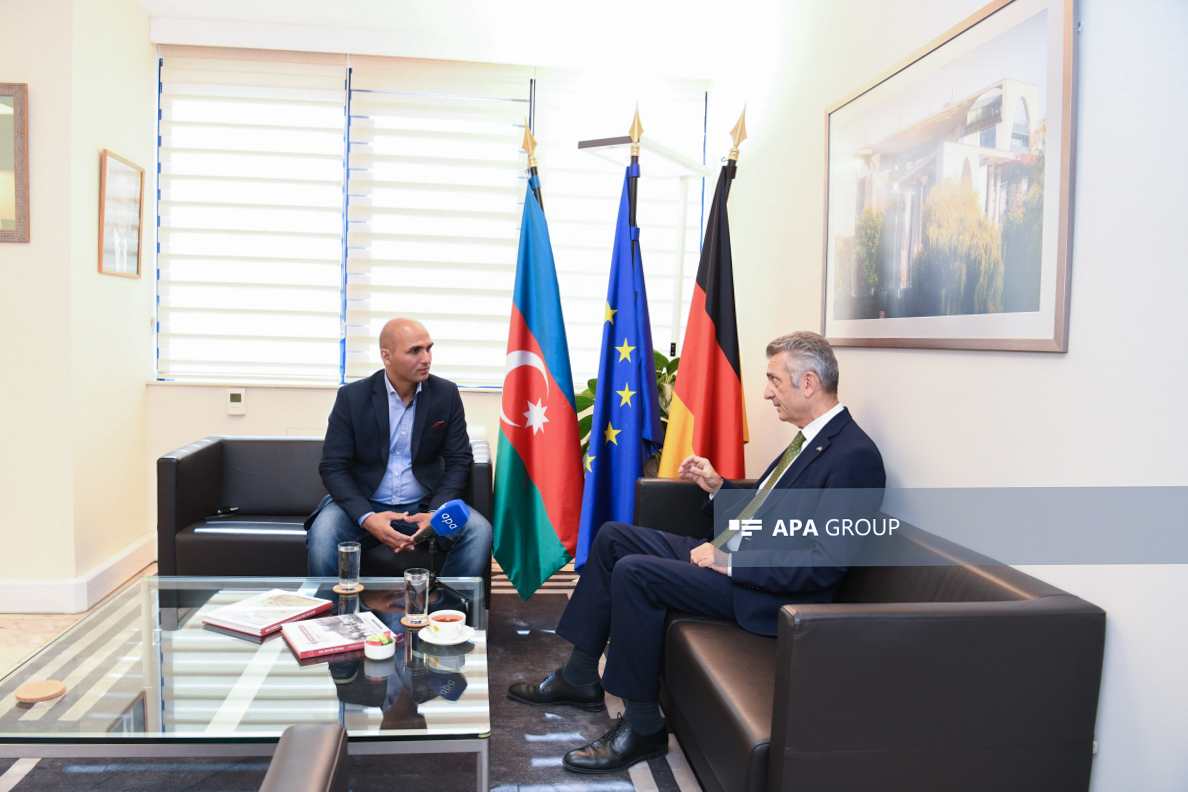
– As the German Embassy, what initiatives are you pursuing to promote German business engagement in the Azerbaijani market? Are there any specific mechanisms in place to encourage new investments?
– Investments are private business decisions, considering a variety of factors. However, the Embassy works closely together with the German-Azerbaijani Chamber of Commerce, the biggest European business association in Azerbaijan, to promote cooperation and investments. Beyond that, the Federal German Government has a number of instruments at its disposal to promote German trade and investment abroad. This includes the support for German companies participating in international trade fairs or making available export and investment guarantees. Moreover, our international economic promotion agency is Germany Trade and Invest. provides market data and analysis to companies interested in expanding their business abroad.
Germany-Azerbaijan cooperation continues in renewable energy and green transformation
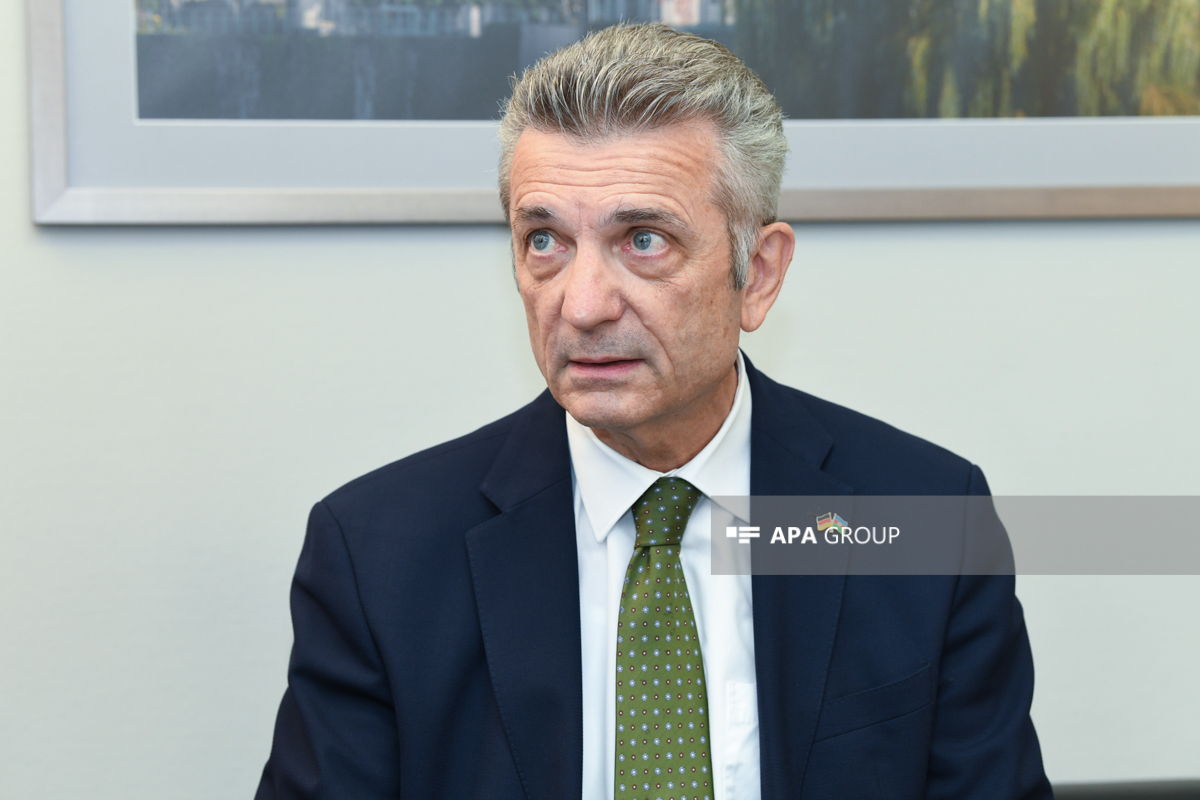
– Cooperation in the field of renewable energy is high on the agenda. How can Germany share its technological know-how and innovative experience with Azerbaijan in this area? Are there any specific projects currently under discussion?
– Germany is a global leader in green energy production and already produces almost 60% of its electricity from renewable sources, mainly wind and solar energy. The know-how and innovation behind this figure are certainly something Germany can bring to the table. German excellence in sustainable technology goes far beyond energy production: I just want to mention the German automotive sector, which is the European Champion when it comes to electric mobility.
German-Azerbaijani cooperation in the field of renewable energy and green transformation is ongoing. The potential for enhancing cooperation on renewable energies was also a key topic discussed during the recent meeting of the German-Azerbaijani High-Level Working Group on Trade and Investment in Baku.
Germany is closely monitoring the development of Karabakh as a “Green Zone”
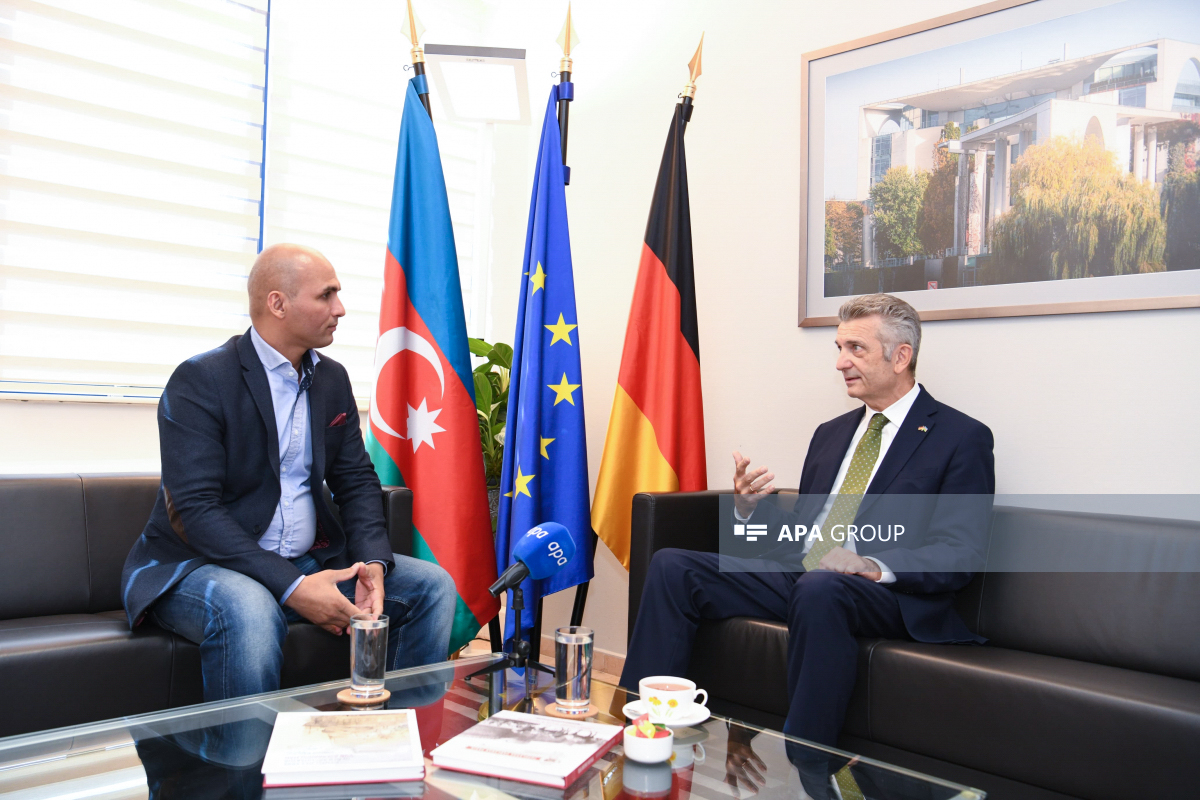
– What can you tell us about the potential involvement of German companies in the liberated territories of Karabakh? In which sectors — infrastructure, energy, urban development, and others can German technology and expertise be applied?
– Germany, with its own experience in reconstruction after reunification in 1990, is leading in many areas that are relevant for the reconstruction in Karabakh. This includes technology, engineering, and sustainability. We follow the development of Karabakh as a “Green Zone” with great interest. It certainly offers many opportunities where German technology and expertise can be a valuable contribution. In recent years, German companies have already been involved in various sectors of reconstruction in Karabakh. For example, an Azerbaijani-German joint venture participated in the construction of several highways and airports in the region. German technology can also be found in other projects in Karabakh, for example, in the production lines of drinking water and hydro-energy production.
EU cooperation and Germany’s support
Germany places great importance on deepening EU-Azerbaijan cooperation.
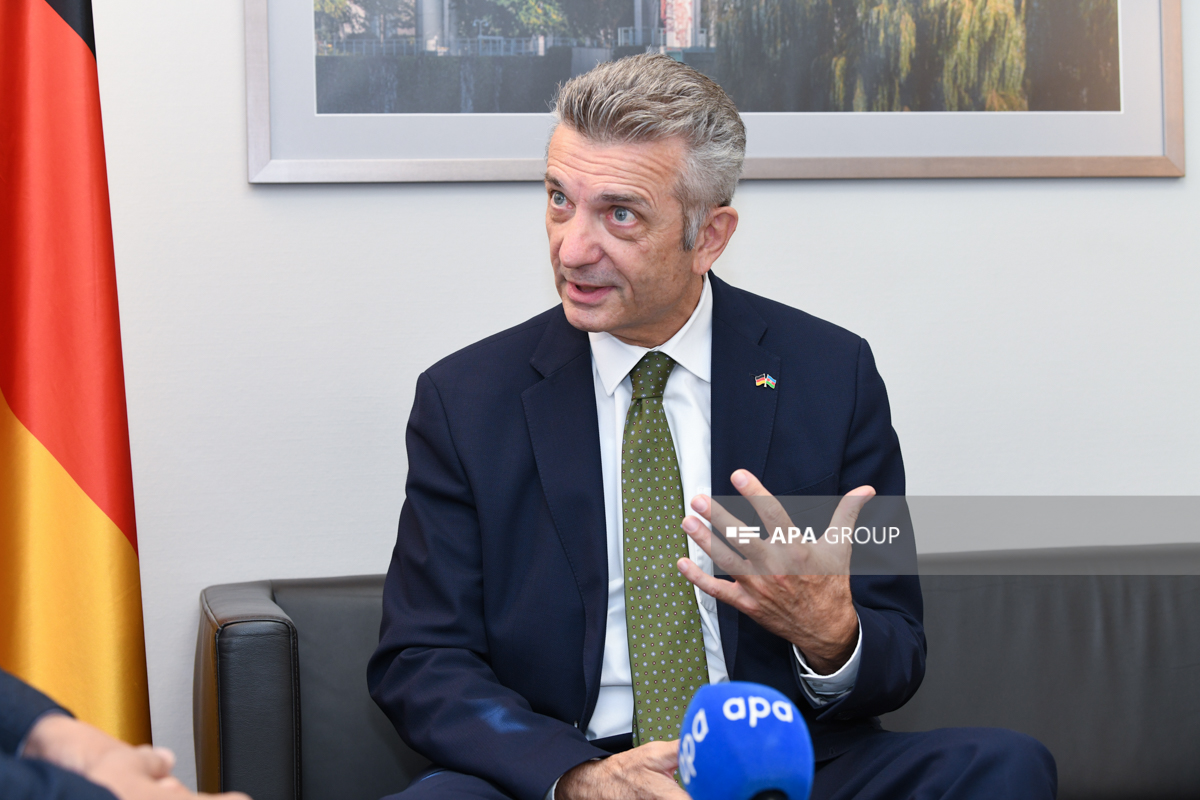
– As a leading EU member state, what role does Germany aim to play in enhancing Azerbaijan’s relations with the European Union? What new opportunities do you see for cooperation, especially in areas such as energy, green transition, and climate policy?
– The EU is the largest trading and investment partner of Azerbaijan. Germany attaches great importance to enhancing EU-Azerbaijani relations. Germany, being the biggest economy within the EU, close cooperation also serves our economic interests. Azerbaijan is an important energy partner for the EU, and can play a significant role as a supplier of renewable energy in the future. With Azerbaijan following its successful hosting of the COP29 and the EU and its member states leading in international climate efforts, these areas provide many opportunities. Together, the EU and Azerbaijan can advance green transition in both regions. Beyond that, transportation and connectivity are areas where the EU can provide vast experience. Azerbaijan is already participating in the EU’s Global Gateway Initiative, in which the Middle Corridor is an important component.
The new agreement has the potential to create new opportunities for cooperation between the EU and Azerbaijan
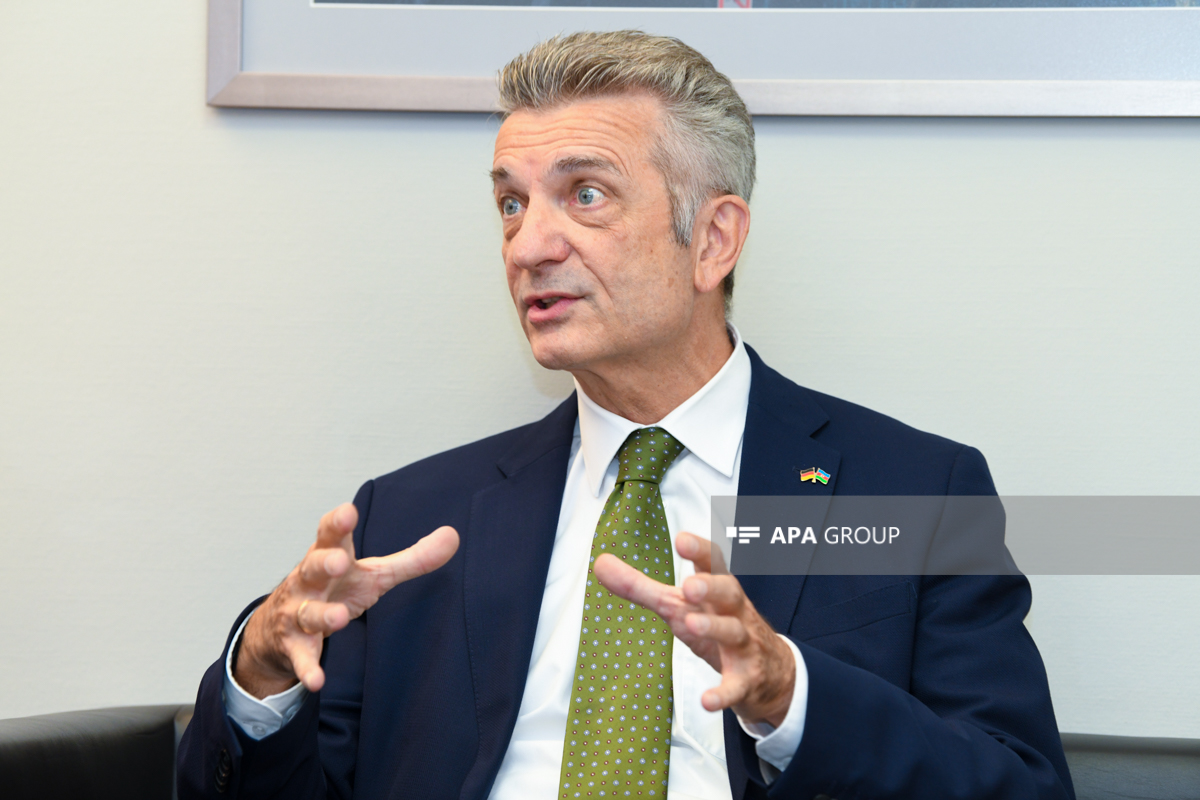
– Negotiations on a new Partnership Agreement between Azerbaijan and the EU are expected to conclude soon. How is Germany supporting this process, and what contributions is it ready to make?
– Relations between the EU and Azerbaijan are governed by the Partnership and Cooperation Agreement that has been in place since 1999. Germany welcomes the talks that started in 2017 with the intention of negotiating a new partnership agreement, including a more comprehensive framework for trade. A new agreement has the potential to open new avenues for cooperation between the EU and Azerbaijan, also economically. Germany, therefore, continues to support the negotiation process. Together with our EU partners, we stand ready to implement mutually agreed cooperation goals.
The Middle Corridor and strategic transport routes
The Middle Corridor is an important transport route connecting the EU, the South Caucasus, and Central Asia
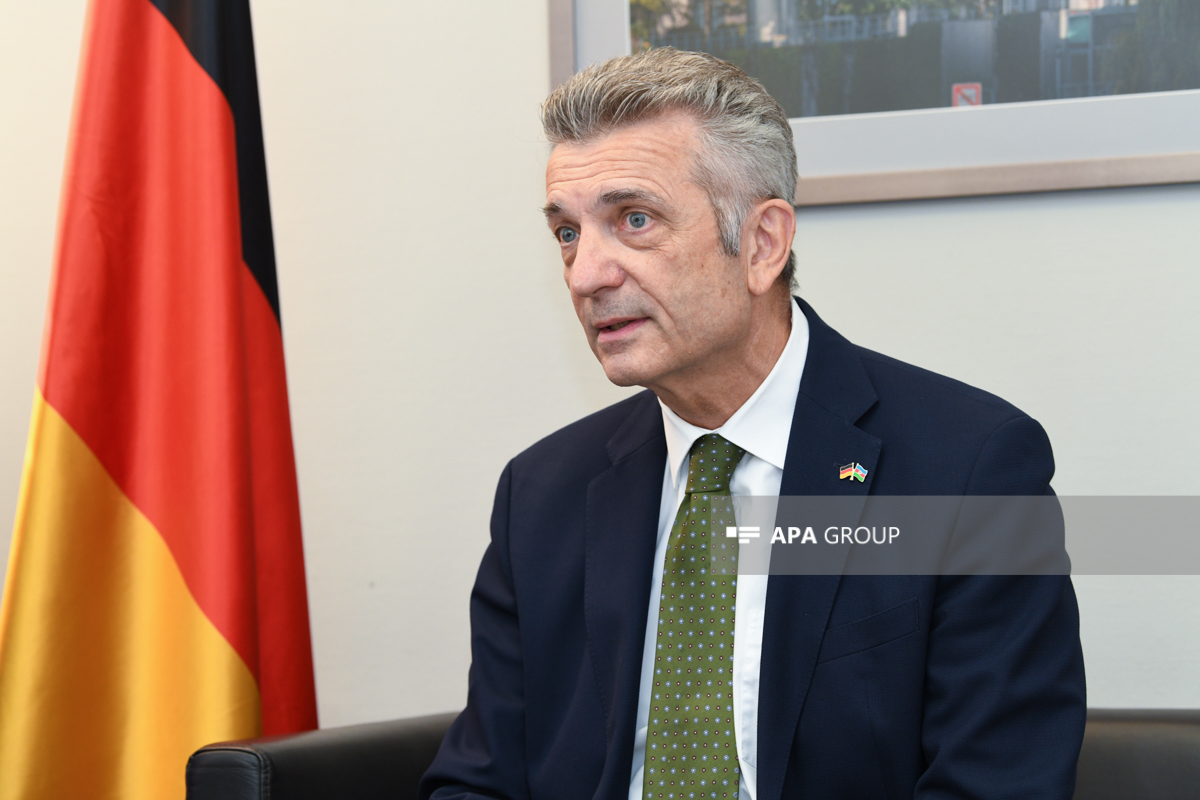
– The Middle Corridor passing through Azerbaijan is becoming increasingly important for Europe-Asia trade. To what extent does Germany consider this route strategic, and how can German business be encouraged to participate in its development?
– The Middle Corridor is an important transport route between the EU, the South Caucasus, and Central Asia. Azerbaijan, with its geographical location, has the potential to become even more important as a logistics and transit hub in the future. The German private sector is fully aware of this potential, in particular regarding the modernization of infrastructure, digitalization, and sustainable logistics. Events organized by the German Eastern Business Association and the German-Azerbaijani Chamber of Commerce, providing information about the Middle Corridor and discussing its potential,l have drawn wide interest from companies representing various sectors. In order to transform the interest in concrete business engagement, Azerbaijan needs to continue presenting itself as an attractive location, creating a business environment conducive to foreign investments.
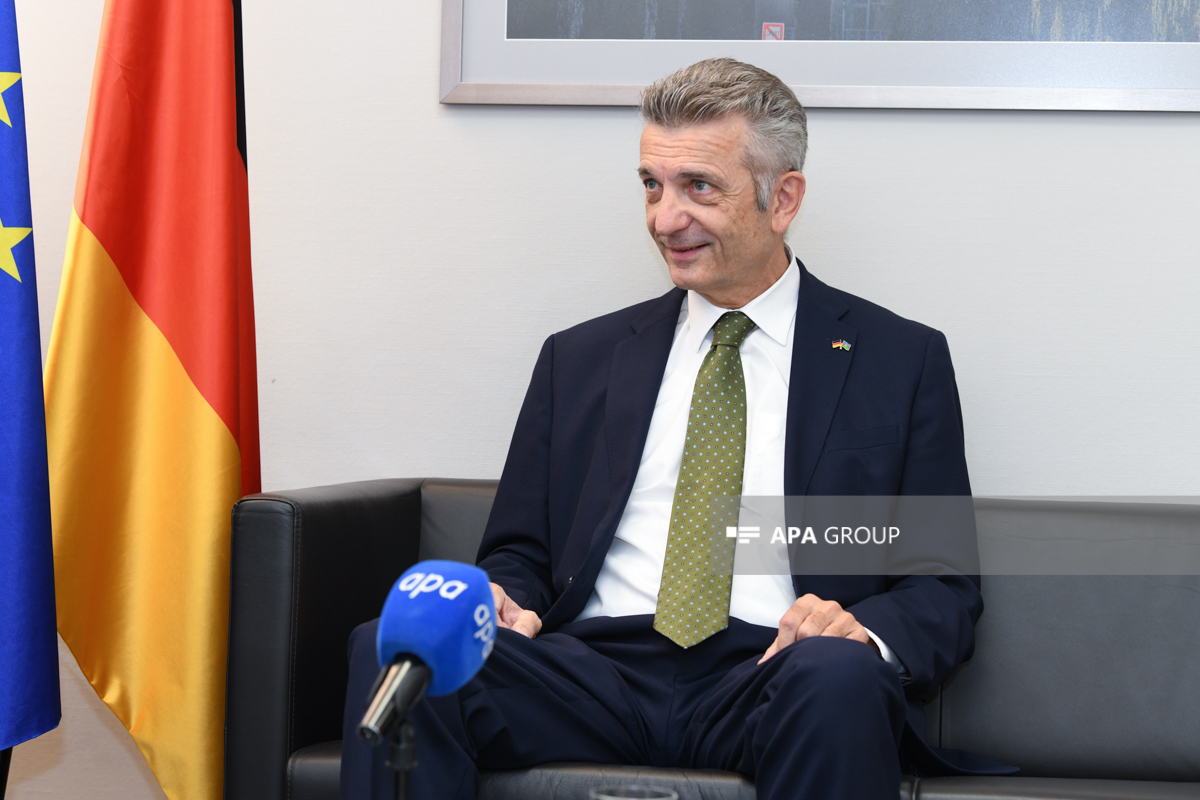
– A new transportation link — the Zangezur Corridor — is planned to connect Nakhchivan with the rest of Azerbaijan. Does Germany view this route as part of the broader Middle Corridor? What is your assessment of its geopolitical and economic significance?
– Increasing regional connectivity holds great economic potential; developing the transit route is an important link to enhancing the Middle Corridor, linking Europe and Central Asia more closely. The connection can speed up the logistics and reduce the costs of transportation, and therefore can have significant economic and political importance for both Europe and Azerbaijan, but of course also other countries and regions along the Middle Corridor. Beyond that, the Middle Corridor and better connectivity in the South Caucasus can underpin the ongoing peace process between Azerbaijan and Armenia and provide new opportunities for economic development and growth in the whole region.
Peace process and regional stability
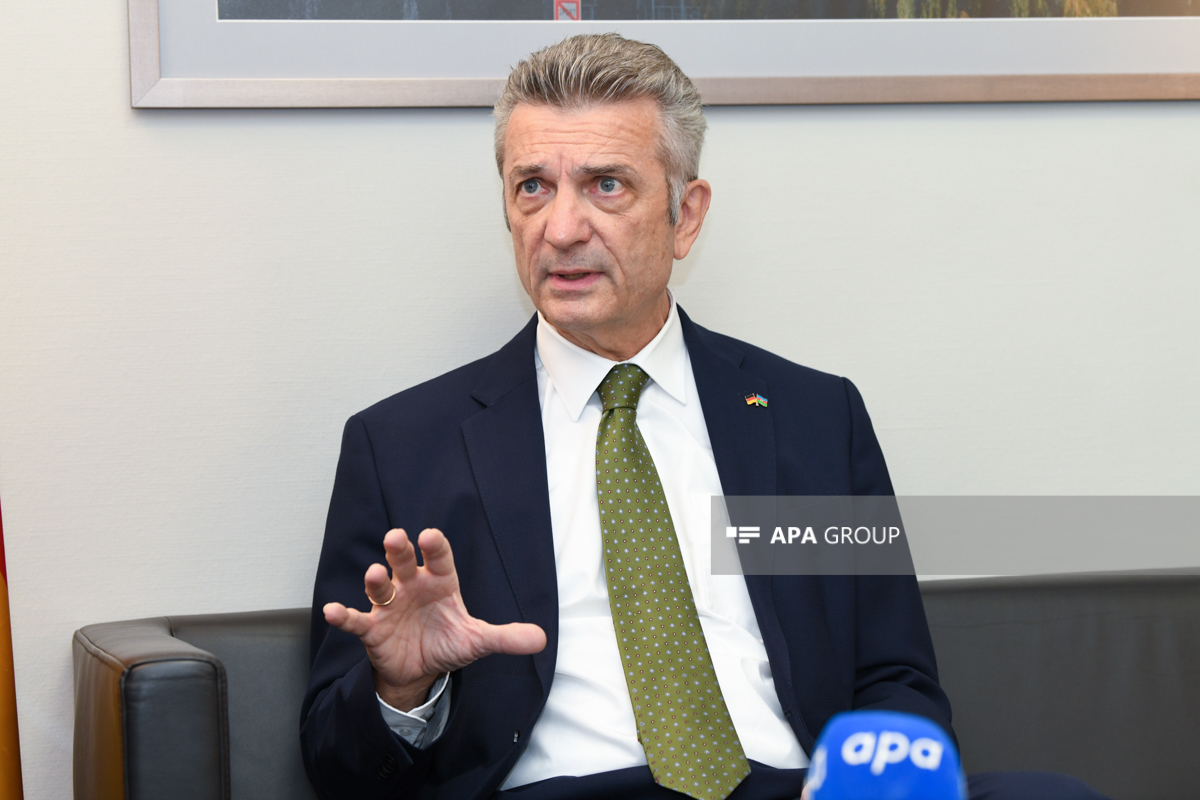
Having experienced centuries of deep enmity and conflict in Europe ourselves, we know well both the cost of war and the benefits of peace
– At a time when peace initiatives are gaining momentum in the South Caucasus, how does Germany view the ongoing negotiations between Azerbaijan and Armenia? What strategic shifts could result from a successful peace agreement? A potential peace deal with Armenia would not only secure regional stability but also create new economic opportunities. In your opinion, could such an agreement accelerate the flow of German and European investment into the South Caucasus?
– The recent developments on the way to a successful peace agreement, as well as parts of the results from the trilateral Meeting in Washington on the 8th of August, are building upon intensive preliminary diplomatic efforts, supported by the European Union and Germany in particular. Since 2021, this has largely been done through our support for EU-led initiatives, headed by the former President of the European Council Charles Michel, but also by hosting several rounds of negotiations in Berlin and Munich between the conflict parties. Germany has always been a strong advocate for peace and stability in the South Caucasus, and has continuously encouraged these efforts through its bilateral diplomacy.
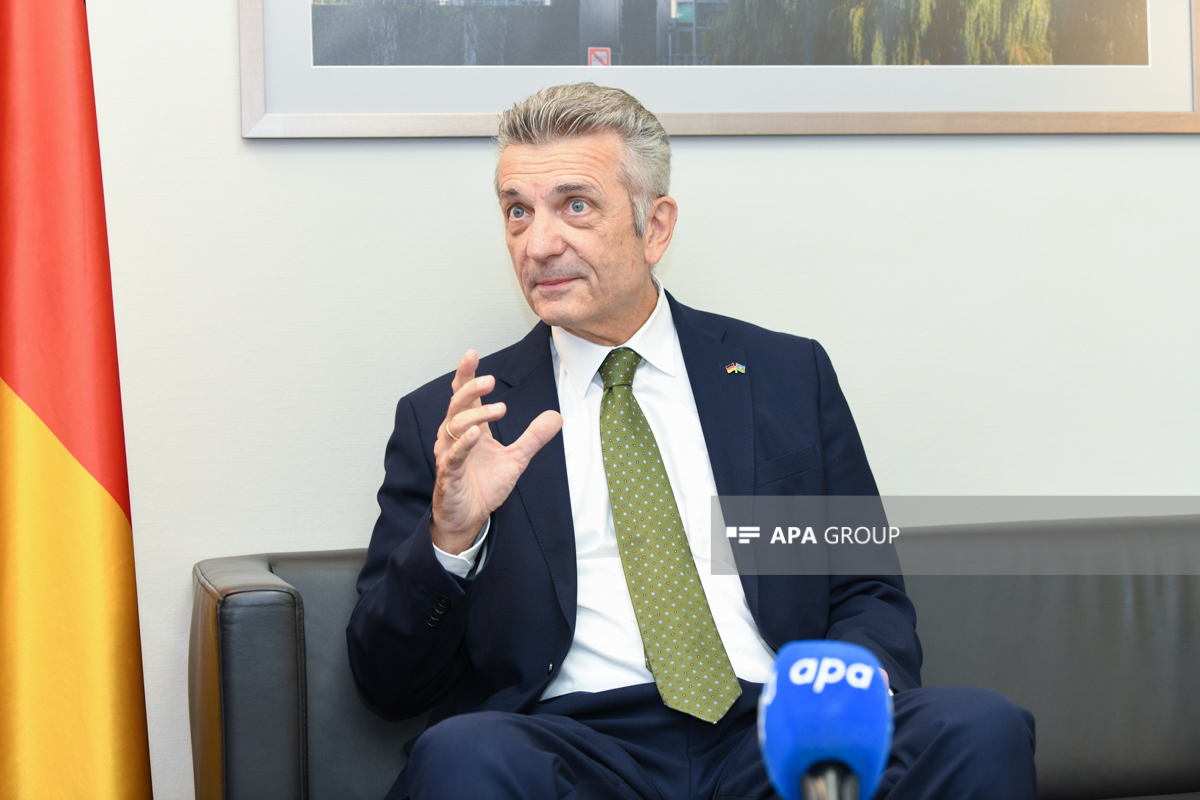
A peace deal, once finally signed and ratified, between Armenia and Azerbaijan could significantly accelerate the flow of foreign direct investment into the South Caucasus, including from Europe and Germany. Peace brings the political stability and predictability that could make the region a more attractive destination for investment. Furthermore, a peace agreement could open up new economic opportunities, particularly in infrastructure, trade, and energy sectors. The South Caucasus could become an important gateway between Europe and Asia, which would be highly appealing to German and European businesses.
Having ourselves experienced deep enmity and conflict within Europe for centuries, we know the price of war as well as the dividends of peace. Therefore, Germany is strongly encouraging ongoing efforts of Azerbaijan and Armenia to finalize all remaining open issues at the negotiating table and reach a lasting peace agreement.
Photo: Ilkin Nabiyev
